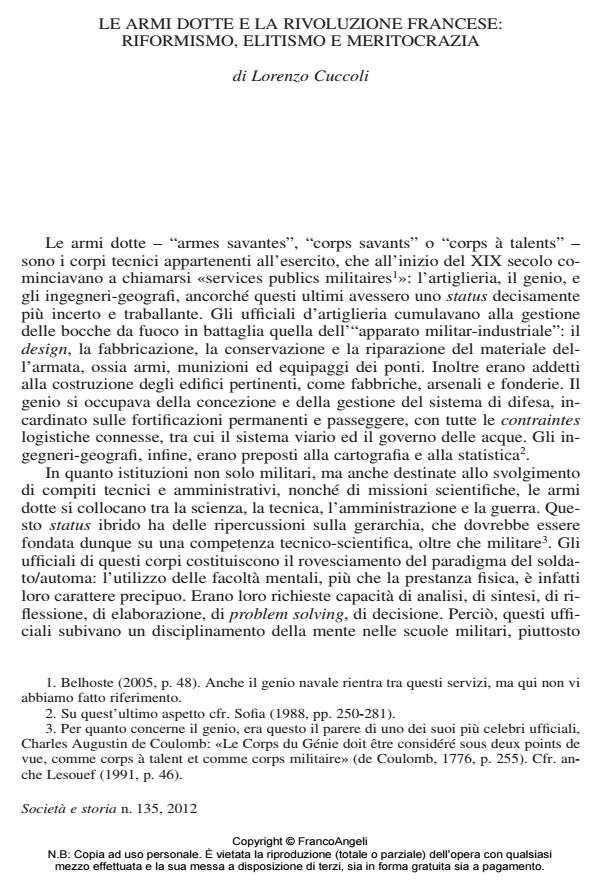Le armi dotte e la Rivoluzione francese: riformismo, elitismo e meritocrazia
Journal title SOCIETÀ E STORIA
Author/s Lorenzo Cuccoli
Publishing Year 2012 Issue 2012/135
Language Italian Pages 23 P. 41-63 File size 512 KB
DOI 10.3280/SS2012-135003
DOI is like a bar code for intellectual property: to have more infomation
click here
Below, you can see the article first page
If you want to buy this article in PDF format, you can do it, following the instructions to buy download credits

FrancoAngeli is member of Publishers International Linking Association, Inc (PILA), a not-for-profit association which run the CrossRef service enabling links to and from online scholarly content.
The article focuses on the evolution of the military technical corps in France between the mid-Eighteenth century and the Restoration, and proposes for them the notion of "State corporation". This phase - an intermediate one between the corps de métier and the corps d’État - was attained first by the engineers and the artillery. These corps selected their officers by competitive examination, which functioned both as an intellectual filter and a social one. The distinction generated by this filter - nurtured by an elitist approach based on meritocracy was not overridden by the Revolution. On the contrary, it was further consecrated by the creation of the École polytechnique, which soon became controlled by the military technical corps. The "State corporation" model was then extended through the École polytechnique to the geographical engineers and the civil public services. The institutional conflicts among the technical corps during the National Constituent Assembly and those between them and the École polytechnique (1794-1799) are analyzed along these interpretative lines. While the former show their corporative resistance of geographical engineers in the name of equality, the latter bring out their corporative resistance to external education of candidates.
L’articolo esamina l’evoluzione delle armi dotte in Francia tra metà settecento e la Restaurazione, proponendo per esse la nozione di "corporazione di stato". Tale stadio, intermedio tra la fase del corpo di mestiere e quella del corps d’État, fu raggiunto precocemente nel genio e nell’artiglieria, i quali selezionavano gli ufficiali per concorso, ossia un filtro intellettuale ma anche sociale. La distinzione generata da questo filtro - frutto di un’ottica elitista basata su fondamenta meritocratiche - non fu superata con la Rivoluzione, bensì ulteriormente consacrata attraverso la creazione dell’École polytechnique, presto allineata alle esigenze delle armi dotte. Attraverso tale scuola, il modello della "corporazione di stato" si impose agli ingegneri-geografi e ai servizi pubblici civili. In questa chiave interpretativa sono analizzati i conflitti istituzionali tra le armi dotte durante l’Assemblea Nazionale Costituente e quelli tra le armi dotte e l’École polytechnique (1794-1799): i primi mostrano le resistenze corporative degli ingegneri-geografi in nome dell’uguaglianza; i secondi le resistenze corporative alla formazione esterna dei candidati.
Keywords: Military technical corps, meritocracy, State corporation, French Revolution, École polytechnique
- Quale storia della società? Uno sguardo sull'epoca moderna Paola Bianchi, in SOCIETÀ E STORIA 178/2023 pp.711
DOI: 10.3280/SS2022-178005 - The Technical Corps Between France and Italy, 1750-1814 Lorenzo Cuccoli, pp.71 (ISBN:978-3-031-68224-7)
- The Technical Corps Between France and Italy, 1750-1814 Lorenzo Cuccoli, pp.45 (ISBN:978-3-031-68224-7)
Lorenzo Cuccoli, Le armi dotte e la Rivoluzione francese: riformismo, elitismo e meritocrazia in "SOCIETÀ E STORIA " 135/2012, pp 41-63, DOI: 10.3280/SS2012-135003